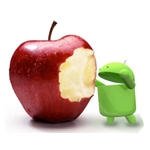
Google and Apple Inc. have been in a tough competition of mobile operating systems where Google present its Android operating system and Apple Inc. presents its Apple iOS. The competition has brought out the best of the best to all phone users. The fact that Apple Inc. has a strong hold in the creation of electronic components does not mean that it cannot face the stiff competition when it comes to meeting the most widely used search giant and multinational internet and software corporation.
Google has a campaign to ensure that all the services applicable to desktop and laptops are accessible via the Google Android. While on the other hand, Apple Inc. is striving to ensure that iOS application are widely spread and readily available than ever before in the history of mobile phone software. Android vs. iOS arguments never cease in the tech world.
Both of these companies, Google and Apple Inc., are well positioned in the mobile sphere and both have customer cult followings. With these two giant companies developing their own mobile operating systems, the heat is up in the mobile market bringing other mobile operating systems down. With BlackBerry's Research In Motion (RIM) falling helplessly, the withdrawal for Nokia's Symbian and Microsoft's Windows Phone that has a lot to catch up, the battle of mobile operating systems seems to be like a two contenders marathon race.
Google Android
Android is a Linux-based operating system first distributed in the year 2007 for mobile devices such as smartphones and tablet computers. It is developed by the Open Handset Alliance led by Google after it was purchased in 2005. It has collaborated with Broadcom Corporation, Google, HTC, Intel, LG, Marvell Technology Group, Motorola, Nvidia, Qualcomm, Samsung Electronics, Sprint Nextel, T-Mobile, Texas Instruments, ARM Holdings, Atheros Communications, Asustek Computer Inc, Garmin Ltd, Huawei Technologies, PacketVideo, Softbank, Sony Ericsson, Toshiba Corp, and Vodafone Group Plc.
Android has a large community of developers writing applications ("apps") that extend the functionality of the devices. Developers write primarily in a customized version of Java. Apps can be downloaded from third-party sites or through online stores such as Google Play (formerly Android Market), the app store run by Google. As of February 2012 there were more than 450,000 apps available for Android, and the estimated number of applications downloaded from the Android Market as of December 2011 exceeded 10 billion.
Applications are usually developed in the Java language using the Android Software Development Kit, but other development tools are available, including a Native Development Kit for applications or extensions in C or C++, Google App Inventor, a visual environment for novice programmers and various cross platform mobile web applications frameworks.
Apple iOS
iOS, formerly iPhone OS prior to June 2010, is Apple Inc.'s mobile operating system. Originally developed for the iPhone, it has since been extended to support other Apple devices such as the iPod Touch, iPad, and Apple TV. Apple introduced its mobile operating system in 2007, in the same year Google did with Android. Apple does not license iOS for installation on non-Apple hardware. As of March 6, 2012, Apple's App Store contained more than 550,000 iOS applications, which have collectively been downloaded more than 25 billion times. It had a 16 percent share of the smartphone operating system units sold in the last quarter of 2010 and accounted for 59 percent of mobile web data consumption (including use on both the iPod Touch and the iPad).
Developers for iOS apps are able to set any price above a set minimum for their applications to be distributed through the App Store, of which Apple will take 30 percent of the revenue and the other 70 percent goes to the developer. Alternately, they may opt to release the application for free and need not pay any costs to release or distribute the application except for the membership fee.
Ever since its initial release, iOS has been subject to a variety of different hacks centered around adding functionality not allowed by Apple. Prior to the 2008 debut of the native iOS App Store, the primary motive for jailbreaking was to install third-party native applications, which was not allowed by Apple at the time. Apple has claimed that it will not release iOS software updates designed specifically to break these tools (other than applications that perform SIM unlocking); however, with each subsequent iOS update, previously unpatched jailbreak exploits are usually patched.
The Battle and Conclusion
There is no question that many of the fundamental capabilities and user interface approaches in Google's Android bear a lot of resemblances to what's in Apple's iOS. In some cases - such as the basic gestures, the use of app screens, and email client layouts - the method has a history predating both products, while in others it is easier to see direct imitation, such as in the use of the app store and the .com key.
But Android is not merely a clone of iOS; it has its own unique capabilities and interface elements, such as its voice-based Web navigation. And in some cases, Apple has somehow been inspired by Google's previous choices. The inspiration in both cases is not limited to each other; both borrow from Windows and Mac OS X, as well as from the defunct WebOS which also borrowed from the same sources.
With Google releasing better and smarter Android, and Apple further updating its iOS, the competition seems to be long from over.
Comparing Android with iOS is like comparing a high tech robot with a state-of-the-art masterpiece. Both are uncomparable. Both are in different leagues, walking on the same path in the same time. Both the Android OS and the Apple iOS have their own pluses and minuses. Both are equally strong contenders, well positioned in the mobile world, have a massive customer cult followings and are bound to rule the app marketplace with their own strengths and advantages.